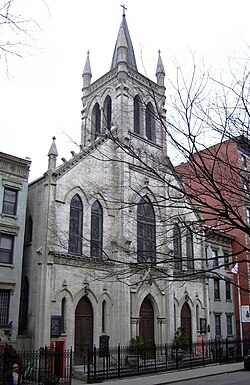St. Stanislaus Bishop and Martyr Church (New York City)
| The Church of St. Stanislaus Bishop & Martyr | |
|---|---|
 Photographed in 2011 | |
 | |
| General information | |
| Town or city | East Village, Manhattan, New York City |
| Country | United States of America |
| Construction started | 1900 (for church); 1907 (for school)[1] |
| Completed | 1901 (for church)[2] |
| Cost | $30,000 (for 1907 school)[1] |
| Client | Roman Catholic Archdiocese of New York |
| Design and construction | |
| Architect(s) | Arthur Arctander of 523 Bergen Avenue, the Bronx (for 1900-1901 church and 1907 school)[1][2] |
| Website | |
| St. Stanislaus Bishop and Martyr's Church, Manhattan | |
The Church of St. Stanislaus Bishop & Martyr is home to the oldest Polish Roman Catholic parish in the Roman Catholic Archdiocese of New York, It is located at 101 East 7th Street between First Avenue and Avenue A in the East Village neighborhood of Manhattan, New York City.
History
[edit]The parish was established in 1872 in a small wooden church at 318 Henry Street until moving to its current location in 1900.[3] Before its current sanctuary, it occupied the Stanton Street Dutch Reformed Church (1845) which had subsequently been used by Congregation B'nai Israel.[2] The address then was 43 Stanton Street.[4] The new church was dedicated by Archbishop M.A. Corrigan and Bishop J.M. Farley on May 19, 1901. A special feature of The New York Times in 1901, mentioned the church, described simply as "the Polish church," among other Catholic structures in the Lower East Side of Manhattan, describing the group "for the most part...limit[ing] themselves to the functions of a parish church, in districts where social needs are otherwise supplied," without comment on other facilities attached.[5]
The parish is staffed by the Fathers of St. Paul the First Hermit. One of its rectors was the Rev. Francis Mylanarski, who served in the armed forces as a chaplain before being was transferred to St. Adelbert's Church (Bronx, New York) in 1919.[6]
Buildings
[edit]The church was built 1900–1901 to the designs of Arthur Arctander.[2] A three-storey brick and stone parish school and dwelling house at 104-106 Saint Mark's Place was built in 1907 to designs of Arthur Arctander of 523 Bergen Avenue, the Bronx for $30,000.[1]
References
[edit]- ^ a b c d Office for Metropolitan History, "Manhattan NB Database 1900-1986," (Accessed 25 Dec 2010).
- ^ a b c d From Abyssinian to Zion (2004)
- ^ Remigius Lafort, S.T.D., Censor, The Catholic Church in the United States of America: Undertaken to Celebrate the Golden Jubilee of His Holiness, Pope Pius X. Volume 3: The Province of Baltimore and the Province of New York, Section 1: Comprising the Archdiocese of New York and the Diocese of Brooklyn, Buffalo and Ogdensburg Together with some Supplementary Articles on Religious Communities of Women.. (New York City: The Catholic Editing Company, 1914), p.372.
- ^ The World Almanac 1892 and Book of Facts (New York: Press Publishing, 1892), p.390.
- ^ "Centres of Civilization; On the Lower East Side of New York", The New York Times, Jul 21, 1901. Excerpt: “Everybody who read it must have been struck by a remark of Mr. Hewitt's, made not very long ago, touching the tenement house district, which was considerably commented on in the press. The remark was that it was not only the part of humanity and charity for the more favored to assist the less favored, but that in this particular case, it was not less the part of prudence…..St. Nicholas in Second Street, St. Rose of Lima in Cannon Street, and St. Teresa in Henry Street. There is also a remarkable church, remarkable for the ...””
- ^ "Clerical Changes in Archdiocese – New Assignments of Pastors and Assistants Announced by Chancery Office – Twenty-Nine New Priests – Many Army and Navy Chaplains Have Now Returned to Diocesan Work" (PDF). The New York Times. October 6, 1919. Retrieved March 11, 2024.


